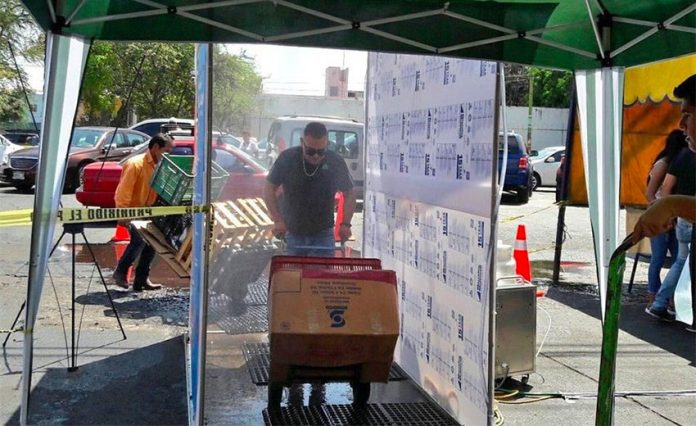Automated sanitation arches and tunnels such as those erected outside Guadalajara’s outdoor food market last month have not proven to be effective in the fight against the spread of coronavirus, government officials say. In fact, they may actually help propagate the virus.
The tunnels, which are being installed in many locations in Mexico, purport to sanitize those who pass through them by spraying people with a high concentration of ozone, which was thought to disinfect a person for up to one hour.
As Salvador Hernández Navarro, president of the Grocery Merchants Union, told media when the tunnels debuted, “we took the initiative to launch this new technology and install this ozone tunnel to serve the large number of visitors we welcome daily. We are the second-largest supply center in the country, and we want people to have peace of mind knowing that we care about your health and the food that is consumed.”
But the reality is something else, says Mexico’s Ministry of Health. “Inhaling disinfectants can cause, among other things, damage to the airways, coughing, sneezing and irritation of the bronchi, triggering asthma attacks, producing chemical pneumonitis and irritation of the skin, eyes and mucosa,” the department said in a press release.
A simple sneeze, according to the Health Ministry’s Hugo López-Gatell, can propel the virus for a distance of up to 10 meters. “There are drops that are too heavy and fall two meters, there are drops that are light and fall six meters and there are drops that are lighter that fall 10 meters away, which can happen if I sneeze.”
Apart from provoking coughing and sneezing, the concentration of the oxygenated disinfectant may be insufficient to inactivate the virus, and the aerosol generated may help spread the virus, which could be present in tiny particles adhering to the clothes, hair or belongings of those who pass through the tunnel.
People would be better served, says López-Gatell, by sticking with the basics of coronavirus recommendations, like social distancing, avoiding crowds, washing hands thoroughly and frequently and wearing masks in public.
Rather than serving as a panacea for market-goers during the global pandemic, the automated tunnels create a false sense of security and could even be making things worse.
“Those virus particles are going to be mobilized and if the sanitization time is not technically monitored, and that depends on the size of the person, the area to be covered and the intensity, … it will not be enough to inactivate the virus and would have the opposite effect,” López-Gatell cautioned.
